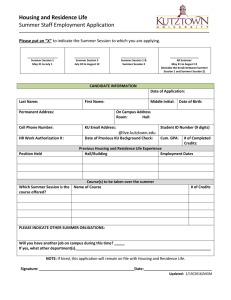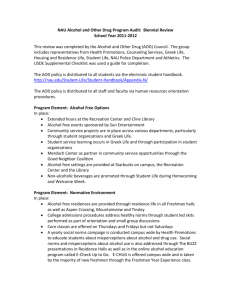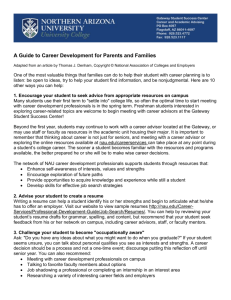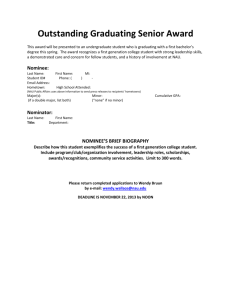2014 Biennial Review of our Alcohol and Other Drug Programs
advertisement
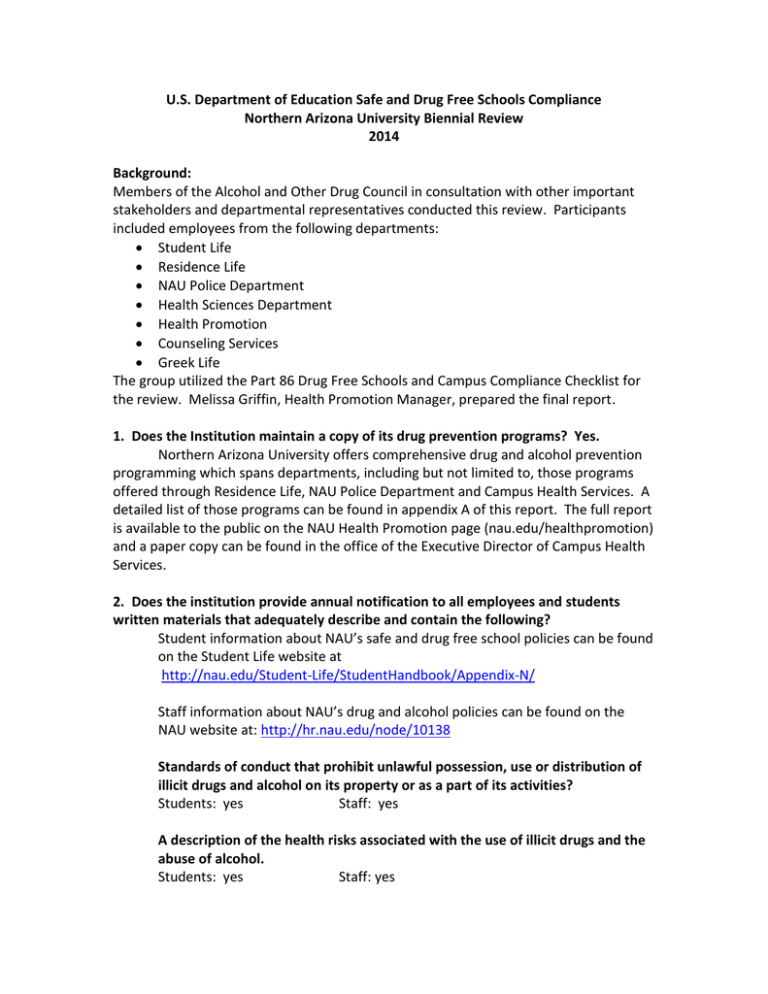
U.S. Department of Education Safe and Drug Free Schools Compliance Northern Arizona University Biennial Review 2014 Background: Members of the Alcohol and Other Drug Council in consultation with other important stakeholders and departmental representatives conducted this review. Participants included employees from the following departments: Student Life Residence Life NAU Police Department Health Sciences Department Health Promotion Counseling Services Greek Life The group utilized the Part 86 Drug Free Schools and Campus Compliance Checklist for the review. Melissa Griffin, Health Promotion Manager, prepared the final report. 1. Does the Institution maintain a copy of its drug prevention programs? Yes. Northern Arizona University offers comprehensive drug and alcohol prevention programming which spans departments, including but not limited to, those programs offered through Residence Life, NAU Police Department and Campus Health Services. A detailed list of those programs can be found in appendix A of this report. The full report is available to the public on the NAU Health Promotion page (nau.edu/healthpromotion) and a paper copy can be found in the office of the Executive Director of Campus Health Services. 2. Does the institution provide annual notification to all employees and students written materials that adequately describe and contain the following? Student information about NAU’s safe and drug free school policies can be found on the Student Life website at http://nau.edu/Student-Life/StudentHandbook/Appendix-N/ Staff information about NAU’s drug and alcohol policies can be found on the NAU website at: http://hr.nau.edu/node/10138 Standards of conduct that prohibit unlawful possession, use or distribution of illicit drugs and alcohol on its property or as a part of its activities? Students: yes Staff: yes A description of the health risks associated with the use of illicit drugs and the abuse of alcohol. Students: yes Staff: yes A description of applicable legal sanctions under local, state, or federal law. Students: yes Staff: yes A description of applicable counseling, treatment or rehabilitation programs Students: yes Staff: yes A clear statement of the disciplinary sanctions the institution will impose on students and employees and a description of those sanctions Students: yes Staff: yes 3. Are the above materials distributed to students in one of the following ways? Mailed to each student (separate from other emails): Yes, electronically Through campus post office boxes: No During freshman orientation: yes During new student orientation: yes In another manner: The Office of Student Life sends emails each semester to all NAU students, including extended campuses, regarding the alcohol and drug policies. Additionally, Residence Life distributes policies on drug and alcohol use to all on campus housing residents. 4. Does the means of distribution provide adequate assurance that each student receives the materials annually? Because the notification is sent to all students via email at least once per year, it is likely that the large majority of students have received the information. 5. Does the institution’s distribution plan make provisions for providing these materials to students who enroll at some date after the initial distribution? The policy is distributed via email every semester to all students. The Office of Student Life will work to ensure the notifications are sent out after the final day for students to enroll in order to reach all enrolled students. 6. Are the above materials distributed to staff and faculty in one of the following ways? Mailed: Yes, via email at least once annually. Once through the distribution of the Clery report and again through email communications from the Office of Public Affairs. Through campus post office boxes: No During new employee orientation: Yes. New employees are required to sign a form confirming receipt of University policies regarding alcohol and drug use. 7. Does the means of distribution provide adequate assurance that each staff and faculty member receives the materials annually? Yes. Staff members sign an agreement that they received notification of policies. 8. Does the institution’s distribution plan make provisions for providing those materials to staff and faculty who are hired after the initial distribution? Yes. Employees receive this information during employee orientation regardless of the time of year hired. 9. In what ways does the institution conduct Biennial Reviews of its drug prevention program to determine effectiveness, implement necessary changes and ensure that disciplinary sanctions are enforced? Conduct alcohol & drug use surveys: Yes, Health Promotion Conduct opinion surveys of students & staff: Yes, Health Promotion & Counseling Services Evaluate comments from a suggestion box: Yes, Campus Health Services Conduct focus groups: No Conduct intercept interviews: Yes, Health Promotion Other: The Health Promotion office conducts annual large scale surveys to assess trends in students’ health behaviors including the use of alcohol, drugs and tobacco. This information is shared in the Alcohol and Other Drug Council (AOD) meetings as well as with stakeholders throughout the campus community. Health Promotion also assesses all large educational events through surveys and uses intercept interviews to assess impacts of educational media campaigns. Residence Life evaluates all of its educational programs through program evaluation surveys. Repeat offenses with the conduct system are very low which suggests that the conduct system is working effectively. Assess effectiveness of documented mandatory drug treatment referrals for students and employees: Students: Yes. The Healthy Choices class is an alcohol and drug diversion program provided by Counseling Services. Post-satisfaction and knowledge assessments are conducted for all participants to measure changes in knowledge about the risks of alcohol and drug use. My Student Body, an online conduct course, is used for low level alcohol and drug offenses and includes outcomes data related to knowledge of alcohol, drugs and satisfaction with the course. Assess effectiveness of documented cases of disciplinary sanctions imposed on students and employees Students: Repeat offenders are tracked and monitored through Student Life and Residence Life Other: The NAUPD conducts an annual Campus Safety and Security Report which is made widely available to the campus and community. 10. Who is responsible for conducting these Biennial Reviews? The Alcohol and Other Drug Council conducts the Biennial Review for NAU. The committee is chaired by representatives from Campus Health Services and has wide representation from other campus departments including Residence Life, NAU Police, Academics, Greek Life and the Office of Student Life. 11. If requested, has the institution made available to the Secretary and the public, a copy of each requested item in the drug prevention program and the results of the Biennial Review? Yes. If requested, these materials can be made available to the Secretary. An online version is also readily available to the public at nau.edu/healthpromotion in the Alcohol section. 12. Where is the Biennial Review documentation located? Executive Director, Campus Health Services (928) 523-6347 And online at nau.edu/health promotion within the section labeled Alcohol Appendix A: Comprehensive List of NAU’s Alcohol & Drug Prevention Programs Departmental Programing: 1. Athletics My Student Body is completed by freshman athletes as part of the freshman academic coursework 2. Counseling Services (CHS) Outreach, presentations to classes and groups Treatment and Assessment o Forced referrals are received by Student Life and Residence Life for alcohol and drug violations. Healthy Choices psychoeducational groups are utilized as a diversion education service for those students. Education and risk reduction outreach o Outreach presentations are given by request to campus groups interested in learning more about the risks of alcohol and drug use 3. Health Promotion (CHS) My Student Body is an online educational program which addresses alcohol, drug use and sexual violence. Through collaboration with other campus departments, this program is provided to students. Incoming freshmen receive a letter from the Dean of Students asking them to complete the course during the summer before they arrive on campus. Social Norms Campaigns are conducted each year to correct misperceptions about the overestimation of alcohol and drug use on campus. Educational and risk reduction media campaigns educate students on risk reduction strategies to help keep campus safe. S.O.D.A.S. (Students Only Driving Absolutely Sober) is a collaborative program with local bars and restaurants providing incentives for students who serve as sober designated drivers. The BUZZ alcohol education presentations are delivered as requested to various student organizations on campus and in Residence Halls. Awareness campaigns o National Collegiate Alcohol Awareness Week, Safe Spring Break, Standard Drink Challenge Shot of Reality is an alcohol education program that targets freshmen and Greek Life National Alcohol Screening Day provides alcohol screening and risk reduction information to participating students. Alcohol & Drug use data sharing with stakeholders Flannels and Flapjacks alcohol free alternative event is event specific prevention and is a collaboration between multiple departments Backpack articles educate parents about risks of alcohol and drug use in college and provide resources Take a Stand! Bystander training empowers students to intervene in dangerous situations including alcohol poisoning and sexual assault 4. Medical Services (CHS) Medical Providers and Nursing staff regularly screen students for highrisk alcohol and drug use and provide risk reduction information or referrals to treatment. 5. Academics Health Science curriculum includes coursework specific to high-risk behaviors and alcohol/drug use. This information is included in the following programs: o Public Health/ Allied health o Fitness and Wellness courses o Physical Education Courses Student Clubs focused on health education and prevention activities Freshman Year Experience, with University College, has incorporated information about alcohol and drug risk reduction for all freshmen 6. Greek Life Greeks Advocating Mature Management of Alcohol (GAMMA) is a student organization focused on risk management within the Greek system. They provide programming in the following settings: o National Collegiate Alcohol Awareness Week, party registration and monitoring, Safe Spring Break campaign, Greek Leadership Summit, Greek Week Key note Speakers on hazing and risk management strategies o Some of the Greek chapters require completion of alcohol education programs such as GreekEdu. 7. Residence Life Professional staff and Resident Assistant trainings include information on: o Crisis intervention, emergency response, policy education, peer mentoring Standards of Residence cards are distributed at student check in and include information about alcohol and drug use on campus My Student Body is completed by all Resident Assistants o The conduct module of My Student Body is utilized for low level violations of the alcohol and drug policies within the standards of residence Parental notification is provided to parents of students who violate alcohol and drug policies Wing/floor meetings occasionally address alcohol and drug use Passive hall programming includes informational bulletin boards and electronic notifications about alcohol and drug use Active hall-based programming/campus-wide programs Informational cards are available to residents (Jacks Cares Cards) that outline risks of alcohol use and provide resources RA/Staff policy enforcement and follow up (on call system) Regular review of Standards of Residence Hall Watch program with NAU Police Department 8. Student Life Semester notification of policies Assist in collecting information for Clery report Conduct Process o Forced referrals, Behavior Risk Assessments, My Student Body, Parent notification for medical transports involving alcohol/drugs Online Student Handbook Coordinate town gown relations for lower risk events Good Neighbor Coalition Monitoring of staff and student tailgating at football games 9. NAU Police Department Alcohol and Other Drug (AOD) presentations in residence halls and classes Provide Residence Hall staff training Alcohol and drug information provided at summer orientation Statistics published in Clery report Zero tolerance DUI enforcement Increased training for officers on DUI and Drugs Participate in ACEA wide DUI task forces Receive training and equipment from Governor’s Office of Highway Safety (GOHS) grants Utilize university judicial process for referral and deferrals Participate in Good Neighbor Coalition, AOD council, SSTF Mutual aid response to AOD issues 10. Recreation Services Provide late night hours as an alcohol free alternative 11. SUN Entertainment Provide after hours alcohol free concerts and events Departmental Program Evaluation: Counseling Services Current evaluation: CCAPS alcohol scale items & Healthy choices feedback surveys Recommendations: Track recidivism; evaluate effectiveness of outreach presentations, 30-day follow-up with healthy choices to evaluate changes in behaviors Residence Life Current Evaluations: Community assessment reports, RA program evaluations, student conduct sanction follow-up and verification of completion, staff training evaluations related to specific sessions and workshops Recommendations: Evaluate student conduct numbers annually and compare to previous years, programming impact, My Student Body completion, etc. Evaluate/track repeat conduct violators related to AOD violations. Academics Course assessments related to gains in knowledge of risks associated with alcohol and drug use. For courses that utilize My Student Body, satisfaction and knowledge is assessed. NAU Police Department DUI: Training new officers, GOHS numbers, enforcement numbers -Accurate survey Recommendations: The NAU Police Department will continue to explore different ways in which they can utilize crime statistics and trends data to better inform their practice. Student Life Conduct Process: Track students to verify attendance. Conduct annual re-cap meetings to discuss good and bad outcomes associated with Homecoming events. Conduct annual assessment meetings with local bar owners following large drinking events such as Tequila Sunrise. Recommendations: Collect additional info/reports on repeat offenders. Survey students re: educational programs used in sanction process. Health Promotion All programs are evaluated for satisfaction and changes in knowledge, attitudes and behaviors. My Student Body contains evaluation components online. All presentations are evaluated and saved in a database and used to improve future presentations. Largescale events such as Shot of Reality are evaluated using online data collection systems. The BUZZ presentation evaluation includes information about intent to reduce drinking. Intercept interviews assess knowledge of alcohol risk reduction strategies before and after large media campaigns. Medical Services The SBIRT (Screening Brief Intervention and Referral to Treatment) is evaluated through collection of process data and outcomes data and will eventually include longitudinal assessment of long term impacts on alcohol and drug use. Greek Life: Greeks Advocating Mature Management of Alcohol (GAMMA) track event attendance for all of their prevention programs. Greek Life is currently working toward creating a broad tracking system to monitor all alcohol and drug programs provided within chapter meetings. GAMMA Party Checkers utilize tracking sheets to record any alcohol and drug violations that occur at registered parties. Recommendations: Continue to work on effective tracking and evaluation efforts for all Greek Life educational programs.
